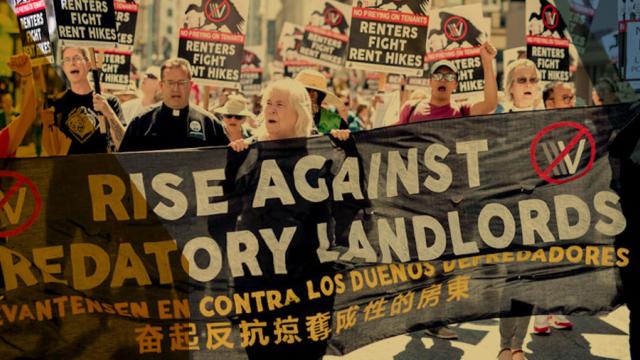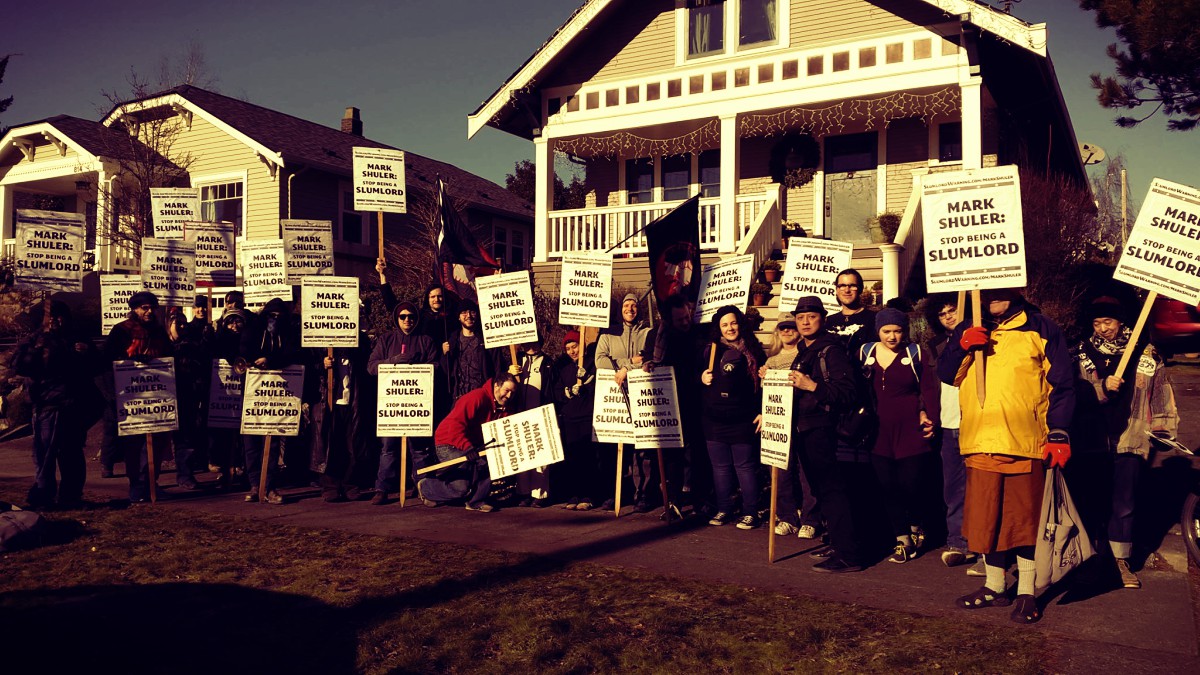
This is the 22nd installment in a series about extending the Green New Deal to confront multiple global crises. Read Part I (Deconstructing environmental racism), II (Rural renewal), III (Upcycle the war machine), IV (GND manifestos), V (No oil bailouts), VI (No corporate ecocide), VII (Defund the police), VIII (Zero Covid approach: NZ), IX (Finnish equality lessons), X (Denmark stops drilling), XI (Costa Rica rewilding), XII (Indigenous justice), XIII (Free public transport) XIV (No borders), XV (Chile's democratic revolution), XVI (Undermining neoliberal dogma), XVII (Climate Litigation), XVIII (Degrowth), XIX (Bullshit Jobs), XX (Universal Basic Income) and XXI (Make Superwealth History).
“Today in our totally normal housing system, you can pay £1,150 a month to sleep in a cupboard. Rent controls now, ” tweeted the London Renters Union in April.
My own apartment is so small the bed folds out of a wardrobe. There’s a wall-mounted TV without space for a seat to sit and watch it, and the annual rent is £13,800 (US$ 17,155).
Landlords like mine are asking prices that would have been considered daylight robbery even five years ago. But this is far from a London-specific problem.
A just future needs universal decent housing. Around the world, a multitude of movements are fighting back, and in some cases scoring popular wins against the landowning classes. In Europe in particular, the trend is growing.
How did we get into this situation?
People globally are facing an escalating cost of living crisis. But in reality, the crisis has its roots far deeper than the mainstream debate often acknowledges. Access to affordable housing is key to the debate.
Great numbers of people are impoverished while others have access to land that they can rent or sell, in turn denying others access to land. Simply put, this means that many face squalid and inadequate housing for which they are paying high rents. The story differs place to place, but there are many parallels.
In England, inequitable access to land traces back to the Middle Ages, circa the 11th century, when common folk were driven off the land. This in turn empowered and made an establishment wealthy. They used this “primary accumulation” to fund colonialism—and kick-start capitalism—the world over.
Owning swathes of land is a thread that runs through English history to today, where the economy is based heavily around finance, insurance and real estate—known by the acronym FIRE. Britain's richest 1%, aristocrats and corporate fat cats, own around half the country's land.
Globally, 60 percent of all assets are real estate (at an estimated value of $217,000,000,000,000), according to the United Nations Office for Human Rights, which wrote: “The vast amount of wealth has left governments accountable to investors, rather than to their international human rights obligations.”
This is no linear narrative in which things always get worse. For instance, in Britain, there were rent controls for much of the last century as well as a social housing expansion—a high point in more equitable access to housing, and a sign of the gains forced by social movement struggles.
Yet these gains were eroded when neoliberals, starting with Prime Minister Margaret Thatcher (1979-90), opened the door wide to finance barging into our homes. This explains why governments are accused of serving landlords, and ignoring human rights.
This power dynamic also explains why governments across Europe have allowed around a sixth of all residential properties to lay empty. Limited supply pushes up rents for landlords, deepening the crisis for everyone else.
Moving towards housing for all
Here are six struggles, movements and big steps—from across Europe—moving towards a future of universal decent affordable homes.
1. Copenhagen resists finance
Blackstone (not Blackrock) is the world's biggest commercial landlord. In 2018 it began buying properties in Denmark, using local companies as fronts. Copenhagen's tenants union was inundated with complaints, especially about astronomical rent rises.
Yet unusually, compared to elsewhere, people organized swiftly. Media attention grew. Lawmakers took up the issue, passing the “Blackstone Law.” This includes measures that investors must own property for five years before rents can rise.
2. Berliners want to expropriate properties
In 2021, Berliners voted 59% to 41% in a city-wide referendum on whether the city should seize properties from mega landlords. The plan was to transfer them into social housing. Yet despite this resounding democratic mechanism, plans from city hall have stalled to make this happen.
This political momentum was led by a number of housing movements, including the Expropriate Deutsche Wohnen campaign. They targeted the corporate landlord with the most apartments. Berlin's housing movement has also had notable successes including rent controls.
There is nothing unusual about maximum rents; Sweden caps rents, for instance. Another example is France: in spring of 2020, Paris, Lyon, Lille and two other French cities introduced rent controls.
3. Barcelona's anti-eviction unit
Doing what Berliners want to do, the municipalist city government of Barcelona has forced the sale of empty properties from corporate landlords, or forced them to rent them at reasonable prices.
Another measure in Barcelona is an anti-eviction unit in city hall that acts to mediate and prevent evictions.
4. Wales is Not for Sale
Worldwide, rural areas face gentrification when outsiders buy second (and often third) homes. This hollows out communities. In Wales it has led to resistance, rallies and other mobilization under the banner: “Nid yw Cymru ar werth” (Wales is Not for Sale).
To tackle this problem, the Senedd (Welsh devolved parliament) has introduced powers for local authorities to heavily tax empty and second homes. These measures will put people off buying locals out of their communities.
5. Zurich & Vienna's social housing and co-ops
Social housing—and cooperative housing, where people co-own a property—prevents capitalists from controlling our homes. Across Europe, and worldwide, there are ebbs and flows of both social and cooperative housing. There is a high tide in central Europe.
In Vienna, for example, over half the city lives in social housing or housing cooperatives. This stands on municipal socialist policies from the era when Vienna was dubbed “Red Vienna” due to its socialist-leaning governance between 1918-34.
Looking west to Switzerland, a quarter of homes in the capital Zurich are Wohnbaugennossenschaften (housing coops).
6. Finland's Housing for All
Finland offers concrete solutions to the housing crisis. As already noted (Part 9), Finland is a world leader in having a strong welfare state, which got far less eroded during the neoliberal period. Finns top global charts for quality of life and other barometers of social wellbeing.
This is no difference when it comes to housing. Finland is the only country in Europe where homelessness is significantly decreasing due to its Housing First policy. One reason for this is year on year it increases its social housing provision.
Vitally, too, homeless people in Finland are first given a home, then secondly assisted to resolve any social issues they may be facing—for instance, drug dependency.
In essence, this is the opposite attitude and intervention towards homeless people elsewhere. In many places, people have to jump through many bureaucratic hoops or resolve medical issues such as addiction before joining a long waiting list for housing. In Finland it’s house first, then rebuild your life.
On a broad level, the Finnish mentality—and the essence of all the other interventions in the housing market—shift us towards thinking that people deserve homes. Reciprocally, corporations do not deserve to make people's lives miserable by blocking people's access to homes.
















